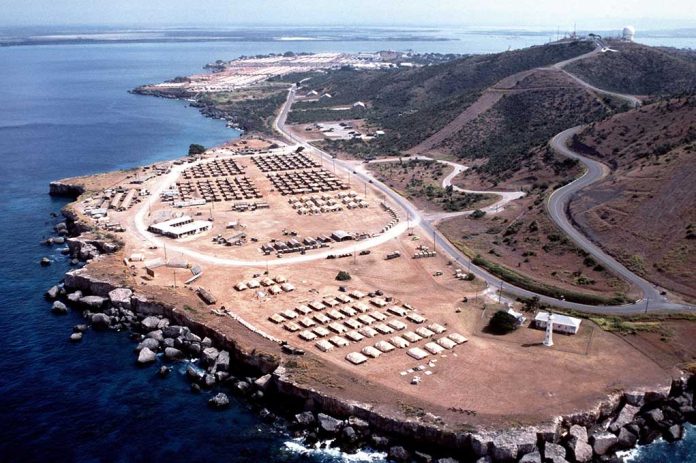
The Trump administration has initiated a controversial plan to repurpose Guantanamo Bay as a detention center for illegal immigrants with criminal classifications, marking a significant shift in U.S. immigration policy.
Key Takeaways
- The U.S. has begun flying illegal aliens to Guantanamo Bay, Cuba, for detention.
- Plans are underway to expand the facility’s capacity to house 30,000 detainees.
- U.S. Marines are being deployed to build new infrastructure at the base.
- The facility will focus on detaining “the worst criminal illegal aliens.”
- This move has sparked criticism from legal advocacy groups and international officials.
Guantanamo Bay: From Terror Suspects to Illegal Immigrants
In a bold move to address illegal immigration, the Trump administration has begun transporting illegal aliens to the Guantanamo Bay facility in Cuba. This naval base, historically used to detain terror suspects, is now being repurposed to house what officials describe as “the worst criminal illegal aliens.” The initiative represents a significant shift in the use of the controversial detention center and marks a new chapter in the administration’s tough stance on illegal immigration.
#Cuba #BreakingNews Photos of illegal migrant criminals boarding planes to Guantanamo Bay have been released.
These are some of the most dangerous criminals in the world
President Donald Trump has been firm on his stance saying Guantanamo Bay will hold the 'worst of the worst'… pic.twitter.com/MmnpRdy9tF
— 👑💥 Serenity 💥👑 (@polishprincessh) February 4, 2025
Department of Homeland Security Secretary Kristi Noem has been at the forefront of this policy shift, emphasizing the facility’s new role in detaining high-priority criminal aliens stating “Guantanamo Bay will hold the worst of the worst. That starts today.”. White House Press Secretary Karoline Leavitt confirmed the commencement of flights transporting illegal aliens to the base, signaling the administration’s commitment to this new approach.
Expansion Plans and Military Involvement
The administration’s plans for Guantanamo Bay go beyond merely repurposing the existing facility. A significant expansion project is underway, with the goal of increasing the detention capacity to an ambitious 30,000 detainees. This expansion involves a substantial military presence, with approximately 200 U.S. Marines already deployed to the base and up to 500 expected to arrive soon.
These Marines are tasked with building new infrastructure, including tents, to accommodate the projected increase in detainee numbers. This military involvement displays the scale and seriousness of the administration’s plans for the facility.
Rationale and Target Population
President Trump has stated that some criminal illegal aliens are too dangerous to be held by their home countries, necessitating their detention at Guantanamo Bay. An executive order specifies that the facility will hold “high-priority criminal aliens unlawfully present in the United States.” This move is part of a broader strategy to manage and detain those immigrants identified as serious threats, fortifying the U.S. stance on illegal immigration.
The Department of Homeland Security has not provided specific details on the flights’ departure points, the number of migrants being transported, or their exact criminal status. Secretary Noem has also not clarified whether women, children, and families would be among those detained at Guantanamo Bay, leaving some questions unanswered about the scope of the policy.
Criticism and International Response
This dramatic shift in immigration policy has not been without its critics. Legal advocacy groups and government officials have voiced concerns, viewing the decision as treating migrants as a new terrorist threat. Some argue that this approach sends a problematic message about the treatment of migrants and asylum seekers.
Internationally, the move has faced condemnation, particularly from Cuban officials who view it as an act of brutality and a violation of international law. The U.S. has leased Guantanamo Bay from Cuba for over a century, but Cuba opposes the lease and rejects U.S. rent payments, adding another layer of complexity to this controversial decision.
As the policy unfolds, its impact on U.S. immigration practices, international relations, and the lives of those detained will likely be subjects of ongoing debate and scrutiny.
Sources:
United States Begins Flying Illegal Aliens To Guantanamo Bay
Trump administration begins first detention flights to Guantanamo Bay
What to know about Guantánamo Bay, the base where Trump will send ‘criminal aliens’



